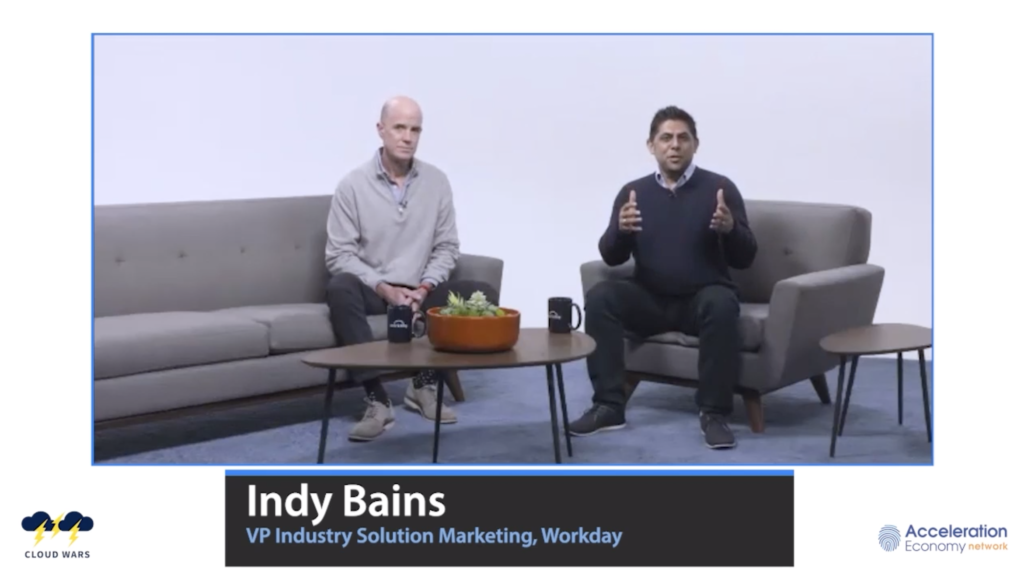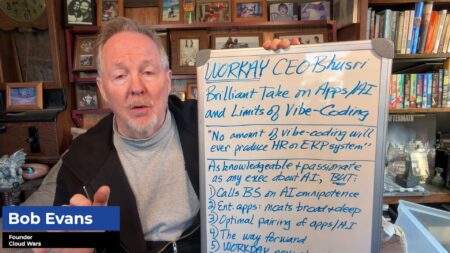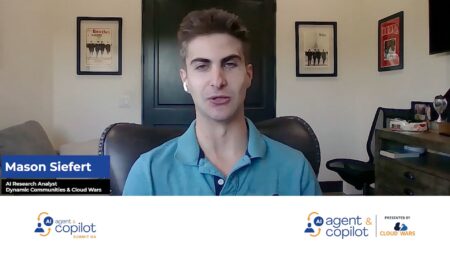Workday’s ‘Born-in-the-Cloud’ Technology is Innovating with the Industry
How fast is fast in today’s economy? Depending on the need, this could be measured in days, hours, or seconds. Further, this speed could determine if companies succeed or fail. A harsh reality, but a necessary jagged pill to swallow.
On top of this, companies are increasingly focused on time to value to stay competitive. Additionally, each industry is experiencing unique challenges which force companies to rethink business models as traditional processes no longer work. Digital optimization is the name of the game as digital transformation has become passe.
To that end, Workday is focused on delivering industry-specific apps to customers whether they are on-premises, hybrid, or multi-cloud. The heart of their innovation is based on the strong industry partnerships and community they have formed.
In November 2021 during Acceleration Economy’s Industry Cloud Battleground, Bob Evans, the Founder of Cloud Wars and Co-Founder of Acceleration Economy, sat down with Indy Bains, VP of Industry Solution Marketing, and Eric Washer, VP of Industry Product Strategy of Workday.
The discussion centered on:
- The effort to double down on investments in the last mile of innovation for specific target industries to speed up the “time to value.”
- Purpose-built solutions that provide the ability to plan, execute, analyze, extend, and repeat, based on company needs.
- The massive shift from extremely outdated systems to modern solutions to attract new talent and become a catalyst for digital acceleration.
Capitalizing on an Intelligent Data Core for Industry-Specific Extensions
The thirst for actionable insights is insatiable. This is fed by the immense data volumes and the realization that data can drive critical decisions. But, how to make sense of it all?
Many industries have a unique set of challenges that require unique data points. With this in mind, Workday, according to Eric Washer, is “maniacal about our innovation strategy of building a data core with industry-specific data core extensions.”
Bains shared the example of FSI where this strategy has been most effective.
- They unlocked the value of their data across the back, middle, and front offices.
- Selection rates north of 70% were achieved in their areas of banking, insurance, and investment management.
- They were able to consolidate multiple systems into one platform. The prior, traditional ERP system couldn’t provide the capabilities that the single platform provided.
Scaling Solutions Across Multiple Industries
It’s no surprise that every business strives to grow to stay relevant and competitive. If a business is content with the status quo, why stay in business? Is it for the clout of staying in business for multiple years to impress current customers?
A future-looking company is faced with many uncertainties that exist in a single industry let alone multiple industries. Faced with this uncertainty, organizations need scalable systems as business increases or demands shift, or an immediate crisis surfaces.
Eric Washer shared the intense focus on meeting customer needs in a couple of highlights:
- Healthcare customers are fusing non-Workday patient scheduling and healthcare records systems. However, Workday is bringing the data in to provide holistic analysis for demand planning and scheduling, and management of inventory, space, and staff.
- Retail customers are bringing data into Workday to help manage merchandise, restaurant, or supply chain systems. This enables them to balance worker requirements for different regions and locations.
Migrating from Outdated Systems Requires More Than Just Moving Data
The number of companies still using 50-year-old systems is surprising. Richard Nixon was President when many of the processes were implemented and have now become ingrained into the fabric of the company. The immense challenge is not the data, but the culture shock that’s necessary to bring about true, effective results.
Bob Evans brought up an additional pressure that companies are facing: an aging workforce. The tribal knowledge of the old systems and processes is being lost. Further, a new generation of people is demanding modern solutions to address modern needs. If a company doesn’t have the modern solutions available, Evans asked, “Is this where I want to work?”
Washer recognized this situation by outlining how Workday is bringing more advanced technology to help customers.
- Artificial Intelligence and machine learning are infused across all of their development teams. This allows them to start with an AI-first focus versus a traditional approach and add AI in at a later stage.
- Workday is “pushing the envelope” and is “delivering insights to fuel” decisions for different types of users. The daily users who need system-driven guidance to be more efficient, and the advanced users who need technology to create new things to “solve problems in a different way”.
The Mobile-First Experience and Culture
Additionally, the end customer is a mobile-first customer. Bains spoke of the big reason customers are selecting is the “mobile experience”. He further stressed that “if we can’t deliver the kind of experience that our workforce is accustomed to” then they will “come across as a dinosaur”.
To close out the conversation, Evans summed it up perfectly, “It’s almost like a cultural issue within the organizations themselves. They’re changing the sorts of products they make, the services they offer, and the people they’re trying to bring in. And it has to be one of those things that’s easily recognizable in the culture, and the operations, and the mindset of the company”.








